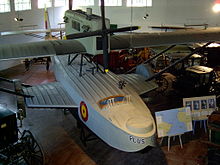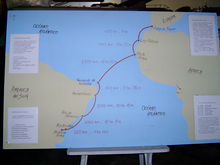Ramón Franco
Ramón Franco | |
|---|---|
 Franco in 1926. | |
| Birth name | Ramón Franco Bahamonde |
| Born | 2 February 1896 FerrolNaval Station,Galicia,Spain |
| Died | 28 October 1938(aged 42) Off the coast ofPollença,Balearic Islands,Spain |
| Allegiance | |
| Service/ | |
| Years of service | 1914–1938 |
| Battles/wars | Spanish Civil War |
Ramón Franco Bahamonde(2 February 1896 – 28 October 1938), was a Spanishpioneer of aviation,a political figure and brother of latercaudilloFrancisco Franco.Well before theSpanish Civil War,during the reign ofAlfonso XIII,both brothers were acclaimed as national heroes in Spain; however, the two had strongly differing political views. However, with the "Ley de Unidad Sindical" of 26 January 1940, his brother Francisco realized many of Ramón's syndicalist political ideals. The syndicate law was unique in Europe and brought Spain a high level of social welfare, housing and labour protection without the high costs of social conflict between stakeholders that normally accompanied such social advancements in other countries.[1]They had a less-known brother,Nicolás.
Aviator
[edit]

Ramón started his career as an ordinary successful military officer in the infantry, assigned toMoroccoin 1914. In 1920 he joined theSpanish Air Force,participating in activities that earned him international attention. Promoted major, in1926he became a national hero when he piloted thePlus Ultraflying boat on atransatlantic flight.His co-pilot wasJulio Ruiz de Alda Miqueleiz;the other crew members were Teniente de Navio (Navy Lieutenant) Juan Manuel Duran and the mechanic Pablo Rada. ThePlus Ultradeparted fromPalos de la Frontera,inHuelva,Spain on 22 January and arrived inBuenos Aires,Argentinaon 26 January. It stopped over atGran Canaria,Cape Verde,Pernambuco,Rio de JaneiroandMontevideo.The 10,270 km journey was completed in 59 hours and 39 minutes.
The event appeared in most of the major newspapers worldwide. Throughout the Spanish-speaking world the Spanish aviators were glamorously acclaimed, particularly in Argentina and Spain where thousands gathered atChristopher Columbussquare inMadrid.
In 1929, he attempted another trans-Atlanticflight, this time crashing the airplane to the sea. The crew was rescued days later by anaircraft carrierof the BritishRoyal Navy.
Political activism
[edit]During the reign ofMiguel Primo de Riverahe declared himself on several occasions against the regime. He conspired against the Monarchy, inflicted losses on the army and was sent to prison, from which he was able to escape. In December 1930, along with otherRepublicanaviators, he seized some aircraft at the aerodrome ofCuatro Vientosand flew over Madrid dropping leaflets which falsely stated a republican revolution had broken out all over Spain, calling on citizens and soldiers to aid the movement and stating that troops' quarters would be bombed shortly if they did not help in the revolution. He fled toPortugaland returned to Spain when theSecond Spanish Republicwas proclaimed.
Reentering the Army, in April 1931 he was named chief of a main directorate of Aeronautics. His tenure lasted 2 months; in June 1931 he was dismissed in wake of aTablada affair,an unclear episode which gave rise to suspicion that Franco was involved in a revolutionary plot inAndalusia.He was elected as a deputy in theCortesforRepublican Left of CataloniainBarcelona,retiring from the army and focused on politics.
Civil War
[edit]When theSpanish Civil Warexploded in July 1936, he was in theUnited Statesas anair attachéof the Spanish Embassy.
Upon his return to Spain, in spite of hisleftistpolitical past, he joined theNationalistside of which his brother Francisco was a main leader. He was promoted to lieutenant colonel and was named head of the airbase atMajorca.His receipt of the command in Majorca was "received very badly" by his fellow aviators,[2]who resented that Ramón, aFreemasonwho had been dismissed, had been promoted over officers with war merits.
Death
[edit]Ramón Franco was killed in anair accidenton 28 October 1938, when hisseaplane,aCANT Z.506,crashed offPollença,near the coast of Majorca, while attempting to bomb Republican-controlledValencia.His body was found floating in the water, and his death led to rumours of conspiracies and sabotage.[3]According to his sister, he was murdered by Freemasons who loaded bricks and mortar aboard his plane because he wanted to publish an anti-Masonic book calledLa burla del grado 33.After the crash, his brother Francisco, who would rule Spain for the next three decades, severed most relations with his brother's widow and daughter.[4]
References
[edit]- ^National Syndicalism in Spain, The Economic Weekly, 15 August 1959, pp. 1145–1148
- ^Payne, S.G.The Franco Regime, 1936–1975.Madison: University of Wisconsin, 1987. p 195 note 91.
- ^Payne, S.G.The Franco Regime: 1936–1975.Madison: University of Wisconsin, 1987. p 195 & note 91.
- ^Payne, S.G.The Franco Regime, 1936–1975.Madison: University of Wisconsin, 1987. p 195–96.
External links
[edit]- 1896 births
- 1938 deaths
- People from Ferrol, Spain
- Republican Left of Catalonia politicians
- Members of the Congress of Deputies of the Second Spanish Republic
- Spanish aviation pioneers
- Spanish military aviators
- History of the Spanish Air Force
- Transatlantic flight
- Spanish Freemasons
- Spanish military personnel of the Rif War
- Spanish military personnel killed in the Spanish Civil War (National faction)
- Aviators killed in aviation accidents or incidents in Spain
- Air attachés
- Victims of aviation accidents or incidents in 1938
